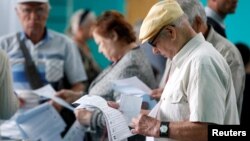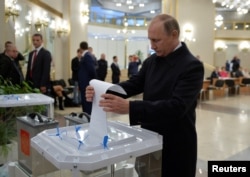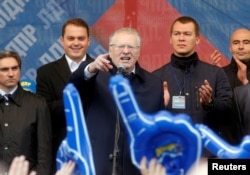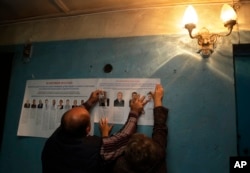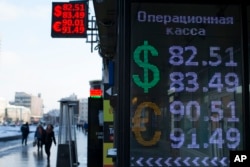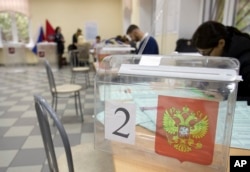Russian lawmakers under President Vladimir Putin have proven themselves nothing if not efficient.
This last session alone, the lower legislative chamber, the Duma, and the upper chamber, the Federation Council, passed nearly 2,000 laws, including a record 160 pieces of legislation by the upper house in one day last June. Despite the presence of three blocs in nominal opposition to Putin's ruling United Russia party, most of the measures passed nearly unanimously.
Welcome to what the Kremlin calls “managed democracy,” a system that simulates democratic institutions, to some extent. Analysts say the tradition is likely to continue when Russians head to the polls Sunday to elect a new parliament.
In 2011, opposition parties were banned from participating, and the results, election observers argued, were marked by widespread fraud. Tens of thousands of people took to the streets to protest the results, and Putin’s rule. Analysts say the Kremlin learned from its mistakes.
“It looked like there was no need for competitive elections [five years ago, but] ... now it's changing,” said Nikolai Petrov, an analyst based in Moscow. “The Kremlin is not eager to practice large-scale fraud. It’s eager to avoid any scandals, to avoid any threat of mass protest.”
Russian spring redux?
With that in mind, the Kremlin insists these elections will be different. Raucous televised debates have become the norm.
So, too, have Western-style political ads on television and street canvassing by party volunteers. Most noticeably, more political parties are campaigning; a few are led by some of the opposition leaders who rallied against the Kremlin in 2011.
Yet even the opposition argues a shake-up in Russia’s pliant Duma remains unlikely.
Mikhail Kasyanov, a onetime prime minister under Putin who has since joined the opposition, will lead the liberal PARNAS party in Sunday’s vote. But despite appearing in televised debates, Kasyanov calls these elections a sham. He says he and other party members have faced routine harassment at rallies and a relentless smear campaign on state television.
“They're letting us participate to show you — the West — that we're a free country,” Kasyanov said. “Putin loves imitations of everything — of separation of powers, of independent courts and a free press. And of course, he loves imitations of fair elections.”
The limits of these elections have also been on display.
Consider problems the Levada Center has faced as election day approached. Russia's sole independent polling organization, Levada, was labeled a "foreign agent" by authorities under a law that bans foreign funding of Russian nongovernmental organizations involved in loosely defined “political activities.” Levada representatives say their troubles began only after opinion polls showed support for Putin's United Russia party ebbing. The “foreign agent" label prevents it from conducting research into Sunday’s vote.
Still, most analysts expect United Russia to retain its grip on power. Despite an economy struggling with Western sanctions over the annexation of Crimea and low world oil prices, the party is buoyed by Putin’s continued popularity.
Also aiding United Russia’s showing: low voter turnout amid repressive measures introduced in the wake of the 2011 protests. There were arrests and sentencing of opposition figures and supporters — an effort that stoked fear in the movement, opposition leaders acknowledge. There was also the conviction of Alexei Navalny, the nominal leader of the opposition movement, preventing his participation in further elections.
And then there was the slaying last year of opposition leader Boris Nemtsov. Although several arrests have been made, Nemtsov’s supporters say police have little interest in finding out who ordered the killing.
With the opposition demoralized and the Kremlin riding high from its annexation of Crimea from Ukraine, political analyst Petrov says the government can simply afford more nuanced election results than in 2011.
“I think this is a little more sophisticated approach, to demonstrate that this kind of opposition will get very tiny popular support,” he said, “to demonstrate how unpopular they are.”
Soapbox politics
On a recent evening in downtown Moscow, Dmitriy Gudkov spoke to a smattering of voters and railed against the powers that be.
Gudkov is the only opposition member of the Duma fighting to retain his seat in parliament. To do so, he’s been forced to switch parties and crowdfund his campaign through soapbox meetings with his electorate.
Yet Gudkov rejects the idea that the opposition is weak; it’s just deprived of resources to get its message across, he says.
“If you take a champion swimmer like Michael Phelps and you fill up the pool with acid, he won't able to swim,” Gudkov said. “But it doesn't mean he's a weak swimmer.”
Whatever the results of this election, Gudkov is taking the long view.
“Politics is a marathon,” he said.
Yet watching Russia's beleaguered opposition come in last place may be the real point of these elections.
Barring the unforeseen, it's a Kremlin plan most expect to work beautifully.




